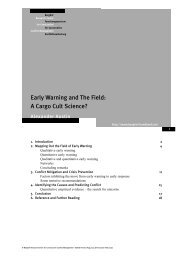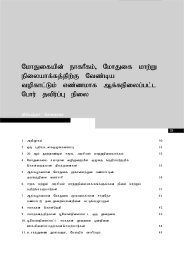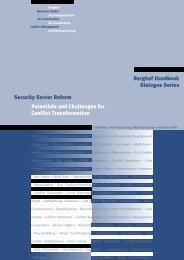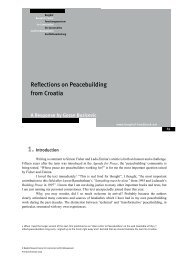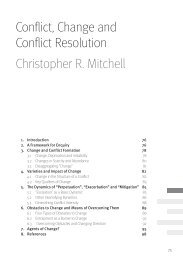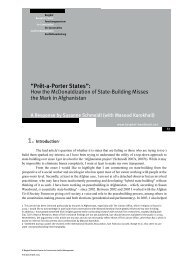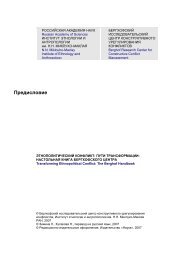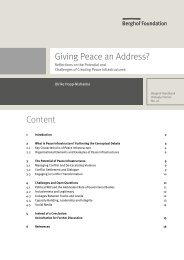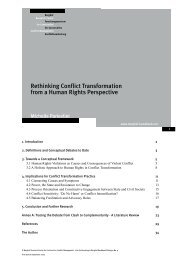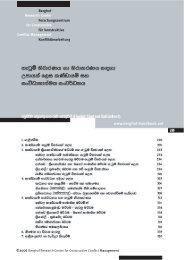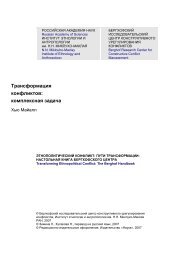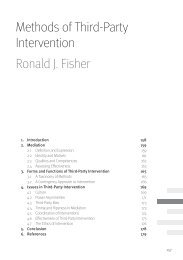Human rights and conflict transformation: The challenges of just peace
Human rights and conflict transformation: The challenges of just peace
Human rights and conflict transformation: The challenges of just peace
You also want an ePaper? Increase the reach of your titles
YUMPU automatically turns print PDFs into web optimized ePapers that Google loves.
About the Authors<br />
Michelle Parlevliet has been working on the nexus <strong>of</strong> human <strong>rights</strong> <strong>and</strong> <strong>peace</strong> work<br />
for some 13 years in various capacities <strong>and</strong> contexts. She recently completed a posting as senior<br />
<strong>conflict</strong> <strong>transformation</strong> adviser for Danida’s <strong>Human</strong> Rights <strong>and</strong> Good Governance Programme in<br />
Nepal, in which capacity she also advised the Embassy <strong>of</strong> Denmark on its support to the <strong>peace</strong><br />
process. She previously worked with the Centre for Conflict Resolution in South Africa, the South<br />
African Truth <strong>and</strong> Reconciliation Commission <strong>and</strong> the International Criminal Tribunal for the<br />
Former Yugoslavia. She has consulted for the World Bank (Indonesia), the Office <strong>of</strong> the UN High<br />
Commissioner for <strong>Human</strong> Rights, the International Council for <strong>Human</strong> Rights Policy, the Northern<br />
Irel<strong>and</strong> Parades Commission <strong>and</strong> numerous other organisations <strong>and</strong> networks. She has published<br />
widely on transitional <strong>just</strong>ice, <strong>conflict</strong> prevention, human <strong>rights</strong> <strong>and</strong> <strong>peace</strong>building, <strong>and</strong> has<br />
developed a distance-learning course on <strong>conflict</strong> prevention for national human <strong>rights</strong> institutions.<br />
She is a member <strong>of</strong> the international advisory board <strong>of</strong> the Centre on <strong>Human</strong> Rights in Conflict at<br />
the University <strong>of</strong> East London <strong>and</strong> a member <strong>of</strong> the editorial board <strong>of</strong> the Journal <strong>of</strong> <strong>Human</strong> Rights<br />
Practice, published by Oxford Journals. In 2008/09, she served as an independent expert to the UN/<br />
Spain MDG Trust Fund in its <strong>conflict</strong> prevention <strong>and</strong> <strong>peace</strong>building thematic window.<br />
Dr Thomas Diez is Pr<strong>of</strong>essor <strong>of</strong> Political Science <strong>and</strong> International Relations at the<br />
University <strong>of</strong> Tübingen, Germany. He previously taught at the University <strong>of</strong> Birmingham <strong>and</strong> was a<br />
research fellow at the Copenhagen Peace Research Institute. Among his most recent publications are<br />
co-edited volumes on <strong>The</strong> European Union <strong>and</strong> Border Conflicts (Cambridge UP, 2008), Cyprus: A<br />
Conflict at the Crossroads (Manchester UP, 2009) <strong>and</strong> European Integration <strong>The</strong>ory (second edition,<br />
Oxford UP, 2009). He received the 2009 Anna Lindh Award for his contribution to the study <strong>of</strong><br />
European foreign policy.<br />
Dr Emily Pia is a lecturer at the University <strong>of</strong> St Andrews, where she teaches Peace<br />
<strong>and</strong> Conflict Studies. She has worked as a researcher on the EU-funded project: <strong>Human</strong> Rights in<br />
Conflicts – <strong>The</strong> Role <strong>of</strong> Civil Society. Her academic interests include IR theory, deconstruction,<br />
human <strong>rights</strong> <strong>and</strong> <strong>conflict</strong> theory. Currently she is working on Narrative <strong>The</strong>rapy <strong>and</strong> Conflict<br />
Transformation.<br />
Alice Nderitu is currently appointed commissioner in Kenya’s national cohesion <strong>and</strong><br />
integration commission, which was created as one <strong>of</strong> the mechansims to address Kenya’s 2008 postelection<br />
crisis. While writing the contribution to this Dialogue, she was the director for Education for<br />
Social Justice (ESJ) with Fahamu, a non-governmental organisation dedicated to the strengthening<br />
<strong>of</strong> human <strong>rights</strong> <strong>and</strong> social <strong>just</strong>ice movements (see www.fahamu.org <strong>and</strong> www.pambazuka.org/<br />
en). She has worked previously as a journalist, a teacher <strong>and</strong> as programme head on education <strong>and</strong><br />
media programmes at the Kenya National Commission on <strong>Human</strong> Rights <strong>and</strong> the Prisons. A Nairobi<br />
University graduate with degrees <strong>and</strong> diplomas in <strong>Human</strong> Rights, Management, Literature, Armed<br />
Conflict <strong>and</strong> Peace Studies, she specializes in training on human <strong>rights</strong>, <strong>peace</strong> <strong>and</strong> <strong>conflict</strong>. She<br />
also is experienced in the development <strong>of</strong> curriculums, information, education <strong>and</strong> communication<br />
materials. She has developed training materials for <strong>and</strong> trained UN agencies, civil society<br />
organisations, law enforcement <strong>and</strong> military <strong>of</strong>ficers at the International Military Peace Support<br />
About the Authors & Editors<br />
115



